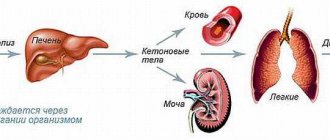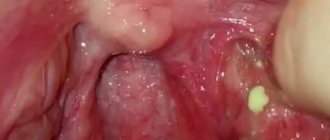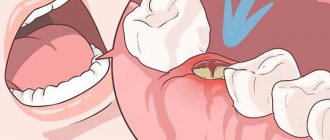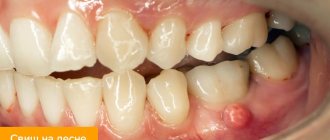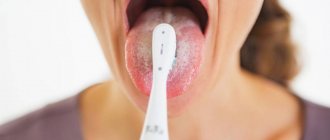The smell of acetone on your breath - does diet matter?
The content of the article
An acetone odor from the breath is felt in people on a low-sugar diet. A decrease in the concentration of carbohydrates leads to the fact that the main source of energy for the body becomes fats, which form ketone bodies. Fats will also be the main source of energy received by the body in case of fasting and a small supply of sugars.
Symptoms of elevated ketone levels due to the ketogenic diet:
- Smell of acetone from the mouth.
An increased concentration of ketones is indicated by a noticeable smell of sour apples from the mouth. - Decreased activity
. Reducing the intake of carbohydrates initially leads to a feeling of constant fatigue, dizziness and nausea. Physical strength also decreases. This state lasts for several days or weeks until the body begins to burn more fat and switches to a new source of energy. - Disruption of the gastrointestinal tract
. The ketogenic diet can also lead to diarrhea and constipation. - Insomnia.
Sleep disturbances are a kind of signal from the body about carbohydrate deficiency. - Decreased appetite.
Patients begin to lose weight and appetite. This is due to the fact that a decrease in the concentration of carbohydrates in the blood leads to a decrease in the concentration of insulin and an increase in glucagon, which stimulates the oxidation of fatty acids. Increased protein degradation when using this diet can lead to negative consequences due to protein deficiency.
A low-carbohydrate, low-fat diet that leads to ketosis has long been used to treat epilepsy, especially in children.
Solutions to the problem
Comprehensive dental treatment is the key to good health of the chewing organs and oral cavity. It includes:
- full diagnostics;
- sanitation of the oral cavity;
- removal of soft and hard deposits;
- therapy of carious lesions;
- correction of bite;
- treatment of dental diseases;
The doctor pays special attention to denim tissues. If there is a need to remove teeth, surgical intervention is performed, after which prosthetics or implantation are planned.
When your breath smells of acetone, you need to eliminate all internal malfunctions and remove provoking factors. It is necessary to carry out thorough oral hygiene, which will remove unpleasant side effects. The problem can be completely overcome when the imbalance in the body is eliminated. To do this, patients must take a blood test for glucose levels, a urine test for ketones, and undergo a complete examination. Patients are prescribed a special diet. This speeds up the healing process.
Acetone breath and diabetes
Diabetes is a group of metabolic diseases that involve hyperglycemia—high blood sugar levels—associated with impaired insulin function or secretion. The patient's body, which cannot use carbohydrates as a source of energy as a result of impaired insulin secretion or action, begins to use fats for this purpose. As a result, ketone bodies are formed, which is the reason for the smell of acetone in the mouth. Some patients compare this smell to the smell of acid, gas or gasoline.
Chronic hyperglycemia causes damage to various organs, mainly the kidneys, eyes, blood vessels, heart and nerve fibers. There are several types of diabetes:
- type 1 diabetes;
- type 2 diabetes;
- gestational diabetes.
Type 1 diabetes is characterized by an absolute lack of insulin due to the destruction of beta cells in the pancreas. But the most common form of diabetes is type 2, which is characterized by impairment of both insulin secretion and function.
Diabetes
Typical symptoms of diabetes: increased thirst, polyuria, dehydration, drowsiness and weakness.
Causes of ammonia odor from the nasal cavity and options for solving them
When we touched on the issue of mechanisms, we can find out the specific reasons for where the unpleasant aroma comes from the nasal passages. We will start with diseases of the nasal cavity, since they occur most often in this situation.
Sinusitis
The sinuses, which are normally filled with air, are connected to the nasal cavity by thin passages. But with the development of inflammatory processes (sinusitis, sinusitis, and so on), the sinuses are filled with pus, which emits unpleasant odors. Also, such diseases are often accompanied by a runny nose, headache and fever.
Most often, treatment of sinusitis involves complex therapy. It includes the administration of antibiotics intramuscularly, rinsing the nasal cavity with medicinal solutions, the use of drops with antibiotics, vasoconstrictors to facilitate breathing, and drugs to reduce the viscosity of mucus. If the disease has not yet progressed too much, you can cope with it on your own. To do this, you may need antibiotic drops (you can buy them at a pharmacy, for example, Isofra, or prepare them yourself from cefazolin, dioxidine, diphenhydramine, lidase and adrenaline), vasoconstrictor drops to ease breathing (for example, Naphthyzin, Nazivin, “NokSpray”, “Lazolvan”), mucus-thinning drugs (“Sinupret”) can also help.
Rhinitis ozena
This disease is accompanied by the development of pathological microflora in the nasal cavity, but the symptom of unpleasant odor appears due to drying of the mucous membrane and the accumulation of microorganisms and mucus residues in the form of crusts on the walls of the nose. Ozen rhinitis is characterized by atrophy of the mucous membrane and occurs due to a number of factors: genetic failures, endocrine disorders, vitamin deficiencies and lack of microelements, due to frequent use of vasoconstrictors, viral infections.
Treatment for a given disease is always consistent with its cause. The disease can be eliminated conservatively or surgically. Conservative methods include administering antibiotics intramuscularly or locally, moisturizing the mucous membrane, administering a glycerin solution of glucose to eliminate the unpleasant odor, administering iodine orally, and eliminating fetid crusts with alkaline solutions. The surgical method involves modifying mucosal tissues, transferring the ducts of the parotid glands and other manipulations. Rhinitis ozena should be treated only as prescribed by a doctor and under his supervision.
ARVI
If viruses are raging in the nasal cavity, some patients experience an unpleasant odor. ARVI is usually accompanied by fever, weakness, sweating, and drowsiness, so you will immediately recognize this disease.
For the treatment of acute respiratory viral infections, drugs based on interferons are prescribed, and to facilitate breathing, vasoconstrictor drugs are prescribed, including Nazivin and Vibrocil.
Postoperative period
If during or after the operation the rules of sterility and care of the nasal cavity were not followed, then it is quite possible for pathogenic microflora to develop in the organ that has weakened after the operation.
If this happens to you, you should immediately consult a doctor for help. He will determine the cause of the pathology and decide which treatment option will be successful. Most often these are antibiotics, anti-inflammatory drugs, which will reduce symptoms and allow antibiotic drugs to eliminate pathogenic microflora as soon as possible.
Foreign body in the nasal cavity
Most often this occurs in children who happily stick all sorts of objects into their nose, mouth, and ears. It is impossible to see an object in the child’s nasal cavity with the naked eye. To eliminate the problem, the doctor must do an endoscopy of the nasal cavity, make sure that there is a foreign body there and remove it.
- The smell of acetone in diabetes: what does a diabetic smell like?
You might be interested in the article - Why does a cough taste like iron?
Causes not related to the nasal cavity
These include, first of all, diseases of the oral cavity. Purulent sore throat due to the proliferation of pathological microflora can cause a foul odor; this also includes stomatitis, pulpitis, and abscesses in the oral cavity.
Such a phenomenon as parosmia is also possible. This is a disorder of smell perception that is associated with neurology. Having discovered such a symptom, you should contact a neurologist and undergo an examination to accurately find out the cause of parosmia and eliminate it.
A serious cause of the smell of ammonia in the nasal cavity can be kidney failure. With this disease, all metabolic products remain in the body, accumulating in the blood and tissues. These include ammonia, which is a product of renal metabolism. Renal failure has a wide range of symptoms, including anuria or decreased diuresis, blood in the urine, protein in the urine, pain, and symptoms of intoxication. If you suspect such an illness, you should consult a doctor as soon as possible. The doctor finds out the cause and eliminates or stops the kidney failure.
The list of dangerous causes of the smell of ammonia from the nose includes gout and vascular diseases associated with the accumulation of metabolic products in the body.
A well-known disease in which we hear the smell of acetone in the nose is diabetes. With this pathology, ketone bodies, including acetone, accumulate in the human blood. Acetone can be excreted through the respiratory tract.
https://youtu.be/h6wwyLv8aEM
Smell of acetone on the breath - ketoacidosis
Patients with diabetes can develop a life-threatening complication called ketoacidosis. This is a complex of acid-base disorders in which ketones appear in the urine and blood. This condition occurs as a result of insulin deficiency. Ketone bodies are most often produced in patients with type I diabetes, but may be present in test results in patients with other types of diabetes.
Sour breath is not the only symptom of this type of metabolic acidosis. Dehydration, glucose in the urine, electrolyte disturbances, disturbances of consciousness, feelings of weakness, drowsiness, vomiting, nausea, abdominal pain, chest pain, headache, dizziness, flushing, rapid heartbeat and rapid breathing are also observed. Without treatment, acidosis can cause coma.
In addition to diabetes, ketoacidosis and therefore acetone breath can cause:
- bacterial, fungal, viral infections, which increase the need for insulin;
- errors in insulin treatment;
- heart attack and stroke;
- pancreatitis.
Other reasons
The reasons can be very different. One of them is diabetes. Problems with the liver and kidneys cause similar symptoms.
In this case, it becomes difficult to remove processed products from the body and intoxication begins.
- Acetone in the blood: why it appears, signs and forms of increase, diagnosis, therapy
The ammonia smell literally permeates every cell of the body.
Naturally, a person begins to feel it everywhere.
Important! The smell of acetone can accompany people actively engaged in weight loss.
The fact is that when fatty tissue breaks down, it forms two main compounds: glucose and ammonia. During intense training or other methods of sharply burning a large number of calories, a person may well feel an unpleasant odor.
Acetone smell from child's mouth
Children's breath smells like acetone most often due to type I diabetes. The disease develops slowly and insidiously, so parents often do not know that their child is sick. In addition, young patients often experience weight loss, excessive thirst, weakness, and pollakiuria.
This type of odor can also occur when a child doesn't drink enough. Sometimes parents report an ammonia odor from their child's mouth during an infection such as pharyngitis.
A strange smell from the mouth should prompt parents to contact a pediatrician, who will prescribe the necessary examinations.
Prevention and treatment
Blood and urine analysis - with elevated acetone
Suspicion of ketoacidosis requires immediate hospitalization. The first treatment measure is the administration of insulin, which normalizes the chemical state of the blood. Insulin administration also prevents the development of coma and other dangerous complications.
Additional measures to treat the condition:
- Replenishing fluid in the body. If the child is unconscious, fluid is administered intravenously.
- Compensation for lack of electrolytes. Also via intravenous administration.
- Therapy of infectious and inflammatory diseases that provoke ketoacidosis.
To treat ketoacidosis, your doctor may prescribe a different dosage of insulin. The following types of drug may be prescribed:
- Fast acting insulin.
- Long acting insulin.
Prescribing different types of insulin allows you to monitor the patient’s condition on a long-term basis and prevent relapses of the disease.
Preventive measures:
How to get rid of odor
What to do if a person smells of acetone? You can completely get rid of an unpleasant odor only after eliminating its cause. Therefore, first of all, you need to treat the underlying pathology and avoid too strict diets.
The following recommendations from doctors will also help reduce the odor:
- You should try to consume enough fluid.
- Long breaks between meals should be avoided.
- You should shower regularly and use antibacterial soap.
- Wearing clothes and underwear made from natural fabrics will help reduce sweating.
- It is recommended to use deodorants with zinc and aluminum.
The acetone smell is a rather dangerous symptom that should never be ignored. Timely treatment will help avoid intoxication of the body and damage to organs from ketones.
How does the smell appear?
Fat metabolism disorders are the main reason why a person smells of acetone. What does it mean? During the metabolism of fatty acids, their breakdown products are formed - ketone bodies. They are the ones that give off the acetate smell.
Normally, the level of ketone bodies in the body is very low. They are quickly oxidized in the muscles and lungs, releasing large amounts of energy.
If a person smells like acetone, this means that ketones are accumulating in the body. This is observed when there is a violation of carbohydrate metabolism. Ketone bodies negatively affect the acid-base balance in the body. They shift the pH to the acidic side. Doctors call this disorder ketoacidosis. This condition poses a great health risk. Excess ketones have toxic effects on various organs.
Renal pathologies
Why does a person's body smell like acetone? This may be due to kidney disease. With nephrosis, metabolism is disrupted. As a result, the excretion of ketones through the kidneys increases. The acetate odor comes from the patient's urine and sweat.
Nephrosis is a disease accompanied by degenerative changes in kidney tissue. The signs of pathology are as follows:
- increased thirst;
- weakness;
- swelling of the face and limbs;
- decreased amount of urine;
- joint pain.
Without treatment, this disease can lead to kidney failure. Usually a person smells of acetone in the early stages of the disease. As the pathology develops, an ammonia smell appears. This indicates a significant deterioration in kidney function.
The patient is prescribed a diet with a high protein content in food and limited salt and water. Corticosteroids and diuretics are indicated.
